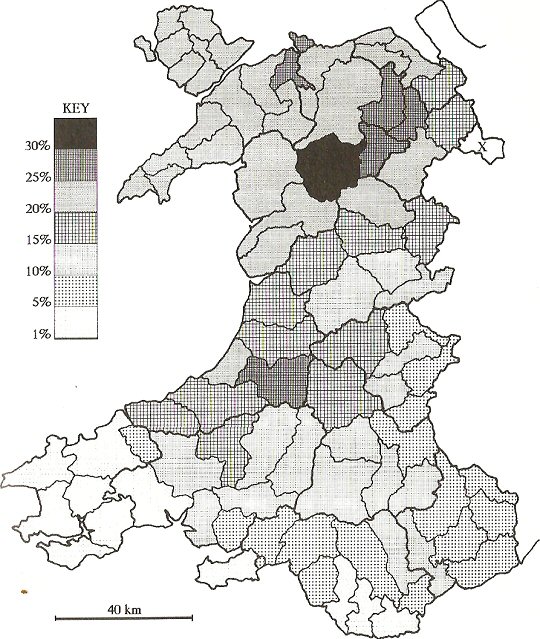Jones is the most common surname in Wales, the second most common surname in the United Kingdom (Smith is first), and the fourth most common in the United States (after Smith, Johnson, and Williams). The surname’s popularity reflects the popularity of the first name John in European Christian communities, presumably because of its tie to revered Christian saints such as John the Baptist and St. John the Evangelist. But what does the surname Jones have to do with the first name John?
Jones is an English name, and the Welsh didn’t begin to use it as a surname until after the English Parliament passed the Act of the Union in 1536 which forced all British families to adopt a surname and translate all names to an English counterpart in legal documents. Up until then, the Welsh had a tradition of patronymic naming by which your father’s first name became your surname, using the term “ap” to signify the “son of.” Once the law changed, the last name related to the “son of” became the surname, so Dafydd ap Richard (David, son of Richard) became Dafydd Pritchard, Dafydd ap Rhys became Dafydd Price, and Dafydd ap Huw became Dafydd Puw or Pugh, and so on (actually, many Welsh were still using the traditional patronymic naming system well into the 1700’s).
In many cases, “son of” is denoted by simply adding an “s” ending, hence the derivation of Williams, Roberts, Davies, Thomas, and, of course, Jones. Because there is no letter “J” in Welsh, John in the form of Ieuan became the surname Evans, and John in the form of Siôn, Ion, or Yon ended up as Jones. “As most Welsh surnames, however, are derived from patronymics, and often based on a small set of first names, Welsh communities are full of families bearing the same surnames, but who are completely unrelated; it cannot be assumed that two people named Jones, even in the same village, must be related. The prevalence of names such as Jones and Williams brought a need for further distinction, and in the 19th century a trend started for double surnames, created by prefixing the name of a house, parish, or the mother’s surname, as in ‘Cynddylan Jones.’ A hyphen was sometimes later introduced, for example ‘Nash-Williams’” (source).
So how do the Welsh manage to keep up with their own Joneses today? Mainly by their love of word play (think Dylan Thomas) and their strong oral tradition (the Welsh produce more famous singers and actors per capita than any other country in Europe). Because of their proliferation of a limited number of similar names, it became common to add a distinguishing feature to a person’s first or last name, resulting in nicknames like “Gwilym Start Up Jones” (who ran the local garage) or “Jones the bread” (the baker) or “Dai Up and Down Jones” (who had one leg slightly shorter than the other; Dai is the diminutive of Dafydd). Other howlers include “Dai the Death Jones” (a carpenter who made coffins for the local undertaker), “Dai 18 Months Jones” (a builder who lost half an ear in a construction accident and was left with 3/4s of 2 “ears”), and “Dai Central Eating Jones” (a plumber with only one tooth in the middle of his jaw).
Editor’s note: To further complicate the issue on a global scale, Johnson is an obvious variant of Jones, the English name “Gene” also translates to John, and “many of German and Scandinavian heritage changed their names to Jones when they moved to the U.S. (from such surnames as Johannes, Johannsen/Johannson, Jantzen, Janson and Jonsson, as well as possibly the French Jensen) (source).
During the Second World War, an American secret service agent was sent to Wales to pick up some very sensitive information from an agent called Jones. His instructions were to walk around town using a code phrase until he met his fellow agent. He found himself on a desolate country road where he ran into a farmer. “Hello,” said the agent, “I’m looking for a man called Jones.” “Well you’re in luck boy-o,” said the farmer, “there’s lots of folk named Jones ’round here. There’s Jones the butcher, Jones the baker, Jones the blacksmith, why even my name is Jones.” “Aha,” thought the agent, “this could be my man.” So he whispered the secret code. “The sun is shining… the grass is growing… the cows are ready for milking.” “Oh,” said the farmer, “you’re looking for Jones the spy.”
Editor’s note: Many thanks to Howard Mathieson and his Surname Distribution Mapping Facebook group for correcting some mistakes in the original article.
Article by Bill Norrington




